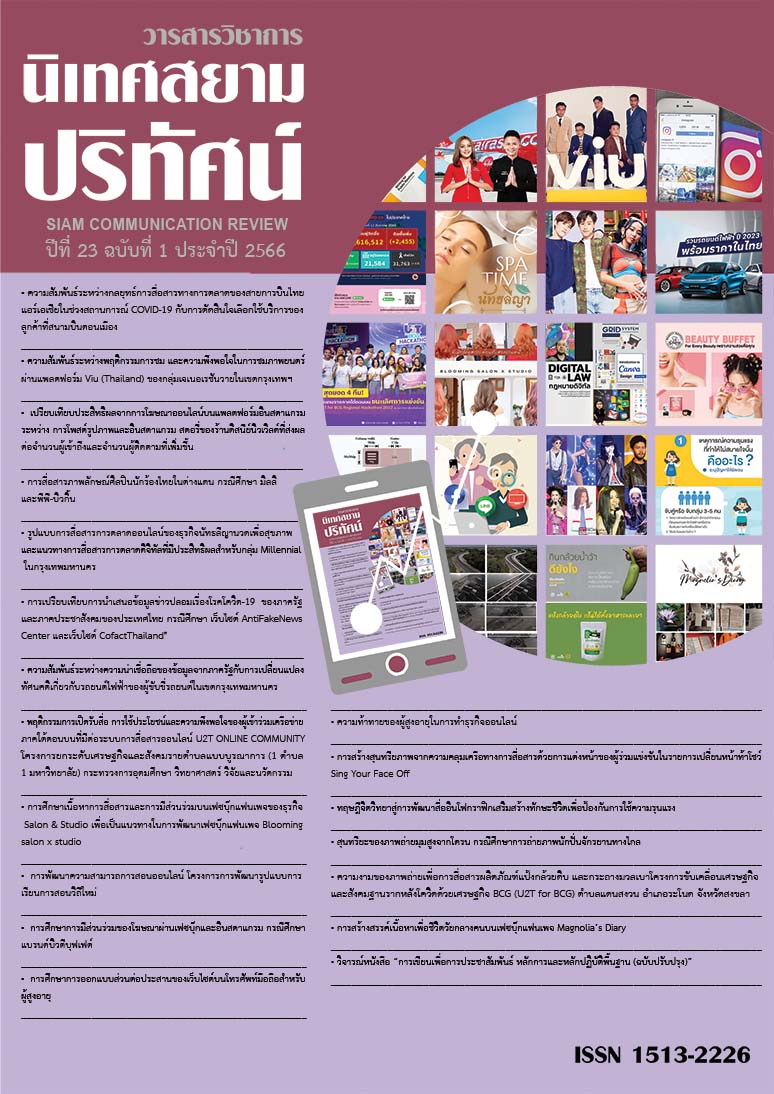The Relationship between Government’s Source Credibility and The Attitude Change toward an Electric Vehicle of Drivers in Bangkok
Main Article Content
Abstract
A study of the Relationship between government’s source credibility and the attitude change toward an electric vehicle of drivers in Bangkok. The purpose of this study is 1) to examine the government’s source credibility toward an electric vehicle 2) to examine the attitude change toward an electric vehicle of drivers in Bangkok 3) the relationship between government’s source credibility and the attitude change toward an electric vehicle of drivers in Bangkok.
Samples were 120 male and female who has a driving license between the ages of 18-59 year old, and attended The Motor Expo 2021 The study used questionnaires as a tool for data collection. The data were analyzed by Pearson’s Product Moment Correlation Coefficient. The results showed that 1) The respondents believe that the goodwill of accountability system is an important data of the government’s source credibility toward an electric vehicle. Due to the respondents can trust an electric vehicle’s information from the government’s presentation. 2) Compliance is an attitude change toward an electric vehicle of drivers. The respondents are interested in using an electric vehicle because the government creates awareness of health impact such as carbon dioxide pollution, toxic dust and PM 2.5. 3) There is a significant relationship between the government’s source credibility and the attitude change toward an electric vehicle of drivers in Bangkok at 0.01 level.
Article Details

This work is licensed under a Creative Commons Attribution-NonCommercial-NoDerivatives 4.0 International License.
References
ณัฐฐิดา กนแกม. (2560). การตระหนักรู้ของวัยรุ่นที่ช่วยส่งเสริมการท่องเที่ยวแบบไม่เร่งรีบแก่ผู้สูงอายุเพื่อการพักผ่อนหย่อนใจ. กรุงเทพฯ: มหาวิทยาลัยเทคโนโลยีราชมงคลรัตนโกสินทร์.
ประภาเพ็ญ สุวรรณ. (2520). ทัศนคติการวัดการเปลี่ยนแปลงและพฤติกรรมอนามัย. กรุงเทพฯ: ไทยวัฒนาพานิช.
พงศ์พุฒิ การะนัด. (2562). ปัจจัยที่ส่งผลต่อการตั้งใจซื้อรถยนต์ไฟฟ้าของผู้บริโภคในจังหวัดนนทบุรี. การค้นคว้าอิสระปริญญาบริหารธุรกิจมหาบัณฑิต, สถาบันเทคโนโลยีไทย-ญี่ปุ่น.
ภูรี สิรสุนทร และคณะ. (2562). โครงการประเมินมาตรการส่งเสริมการใช้ยานยนต์ไฟฟ้าต่อการยอมรับผู้บริโภคและประสิทธิภาพการใช้พลังงานในภาคขนส่ง (รายงานวิจัย). กรุงเทพฯ : สำนักงานคณะกรรมการส่งเสริมวิทยาศาสตร์ วิจัยและนวัตกรรม.
วศะ ธรรมจักร. (2561). อิทธิพลของภาพลักษณ์แบรนด์ การรับรู้ประโยชน์ และการคล้อยตามที่มีผลต่อความตั้งใจซื้อลูกอมปราศจากน้าตาลของผู้บริโภคในเขตกรุงเทพมหานคร. การค้นคว้าอิสระปริญญาบริหารธุรกิจมหาบัณฑิต. มหาวิทยาลัยกรุงเทพ.
Brückmann, G., Willibald, F. & Blanco, V. (2021). Battery Electric Vehicle adoption in regions without strong policies. [Electronics version] Transportation Research Part D: Transport and Environment, 90, 102615.
Ohanian. (1990). Construction and Validation of a Scale to Measure Celebrity Endorsers' Perceived Expertise, Trustworthiness, and Attractiveness, Journal of Advertising, 3, 39-52.
Song, R., & Potoglou, D. (2020). Are Existing Battery Electric Vehicles Adoption Studies Able to Inform Policy? A Review for Policymakers. [Electronics version]. Sustainability 2020, 12(16), 6494.
Umeogu, B. (2012). Source credibility: A philosophical analysis. Open Journal of Philosophy, 02, 112-115.
กิจพณ ไพรไพศาลกิจ. (2564). รถยนต์ไฟฟ้า: แนวโน้ม แรงผลักดัน และโอกาสการลงทุน. เข้าถึงได้จาก https://www.setinvestnow.com/th/knowledge/article/198-investment-opportunity-from-automotive-industry.
ชนะศึก นิชานนท์. (2564). สวนดุสิตโพล: ข่าวสารในช่วงวิกฤตโควิด-19. (รายงานผลการวิจัย). เข้าถึงได้จาก https://suandusitpoll.dusit.ac.th/new/643.html
ธเนศ รัตนกุล. (2562). เมื่อไหร่ ‘รถยนต์ไฟฟ้า’ จะวิ่งทั่วถนนไทย? ส่องนโยบาย Electric Vehicle ในประเทศอื่น. เข้าถึงได้จาก https://thematter.co/science-tech/ev-policies/70558.
นพดล กรรณิกา. (2564). สำนักวิจัยซูเปอร์โพล: รัฐต้องปรับปรุงอะไร ช่วงโควิด-19 (รายงานผลการวิจัย). เข้าถึงได้จาก https://www.superpollthailand.net /ผลโพล
ฟรอสต์ แอนด์ ซัลลิแวน. (2564). เทรนด์ระบบขับเคลื่อนด้วยพลังงานไฟฟ้าของประเทศไทยประจำปี 2564. เข้าถึงได้จาก https://www.nissan.co.th/news/Thailand-leads-ASEAN-in-electrified-vehicle-interest.html.
สุขุม เฉลยทรัพย์ (2563). สวนดุสิตโพล: ความคิดเห็นของประชาชนที่มีต่อรัฐบาล (รายงานผลการวิจัย). เข้าถึงได้จาก https://suandusitpoll.dusit.ac.th/poll-infographic-2563.
เอบีม คอนซัลติ้ง. (2564). การสำรวจล่าสุดเกี่ยวกับทัศนคติของคนไทยต่อการใช้รถยนต์ไฟฟ้า. เข้าถึงได้จาก https://marketeeronline.co/archives/242885


